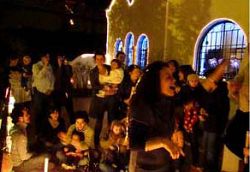Colombians light the way with candles at Advent

SALT LAKE CITY — Latin American and Hispanic Catholic communities are very joyful and creative in the way they celebrate holiday seasons.
The period before Christmas, full of expectations, is an especially joyful one in Colombia as the Colombians begin with their celebrations early: Starting Dec. 7, Colombians get together in a night of candles with family and friends – everyone lights candles in their windows and on the streets.
"Colombia becomes one light", said Deacon Ricardo Arias, Hispanic Affairs Secretary of the Catholic Diocese of Salt Lake City. "The lights illuminate the road for Mary," he said, referring to the feast of the Immaculate Conception on Dec. 8, which celebrates Mary, mother of Jesus of Nazareth, who was born free of original sin.
Arias and his wife, Esperanza, have kept this tradition here in Utah by putting candles in their home. "I think that we have been able to maintain our traditions even though we are a minority," Deacon Arias said.
For nine consecutive days (which is where the word "Novena" comes from), Colombians get together in the evenings with their families, friends or neighbors, every night at a different place. They dance traditional dances such as salsa, meringue, cumbia and porro, and enjoy traditional dishes such as "buñuelos" (fried golden brown doughy balls) and "natilla" (custard-like pudding).
Traditional "villancicos" (Christmas songs) also help create a festive mood.
"We start to have the music songs, like waiting songs, not yet the Christmas carols in Advent that you listen to on the radio stations, all the carols," he said.
Another Colombian tradition are the aguinaldos" a series of games such as the one called "tres pies" (three feet) in which, if a person is standing and not paying attention, another person will put his foot in the middle and say "tres pies, mis aguinaldos", and the person caught will have to pay some money, candy, or something very simple.
Other traditional games are "pajita en la boca" (straw in the mouth), in which a person must have always something in his mouth, "dar y no recibir" (give and receive) in which someone is always trying to give something away and if someone receives it he/she loses, among other games that kids and adults enjoy.
© Copyright 2024 The Diocese of Salt Lake City. All rights reserved.

Stay Connected With Us